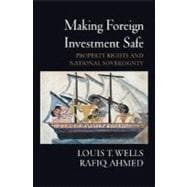
Note: Supplemental materials are not guaranteed with Rental or Used book purchases.
Purchase Benefits
Looking to rent a book? Rent Making Foreign Investment Safe Property Rights and National Sovereignty [ISBN: 9780195310627] for the semester, quarter, and short term or search our site for other textbooks by Wells, Louis T.; Ahmed, Rafiq. Renting a textbook can save you up to 90% from the cost of buying.
| State takeover of infrastructure, 1967-1980 | |
| Indosat : foreign investment in a risky environment | p. 21 |
| The Indosat deal | p. 34 |
| Nationalization of Indosat | p. 42 |
| The power of being needed | p. 66 |
| Indosat : a successful state-owned firm | p. 75 |
| Return of private ownership of infrastructure : electric power, 1990-1997 | |
| Back to private power | p. 87 |
| Paiton's power : the cost of poor preparation | p. 102 |
| Paiton's power : a new contender | p. 113 |
| Paiton's power : more home government support | p. 131 |
| Evaluating paiton I | p. 145 |
| New international property rights in action, 1997-2005 | |
| Paiton I : promises fail | p. 159 |
| Paiton I : backing away from the new property rights | p. 180 |
| Karaha Bodas company : turning to arbitration | p. 204 |
| CalEnergy : claiming official political risk insurance | p. 222 |
| Enron : another kind of official insurance | p. 248 |
| Nationality, corporate strategy, and the new property rights | p. 254 |
| Revisiting privatization and the new international property rights system | |
| Reforming for development and profits | p. 275 |
| Table of Contents provided by Blackwell. All Rights Reserved. |
The New copy of this book will include any supplemental materials advertised. Please check the title of the book to determine if it should include any access cards, study guides, lab manuals, CDs, etc.
The Used, Rental and eBook copies of this book are not guaranteed to include any supplemental materials. Typically, only the book itself is included. This is true even if the title states it includes any access cards, study guides, lab manuals, CDs, etc.